The Recorder made an effort in 2019 to put a spotlight on mental health by telling the stories of people who have struggled with mental health issues and the advocates who want to reduce the stigma associated with those issues.
Often times, those advocates were or are still the ones who also struggle.
TaMara Breeding-Goode said she has tried to take her life four or five times and wrote her first suicide letter when she was 11 years old.
Now, Breeding-Goode leads Project WINGS Mental Health and Wellness Ministry at Scott United Methodist Church, where she helps children, teenagers and adults deal with their mental health issues.
Having a mental health program based out of a church raises eyebrows for some mental health professionals who understand that religious leaders can sometimes give misguided advice about how to combat symptoms of depression, anxiety and so on.
Breeding-Goode said she encourages attendees to get professional help because “it’s OK to have a therapist and Jesus, too.”
The Recorder also heard from Alleyah Getter, a teenager who once thought she would lose all of her friends by the time she got to high school because of how many people around her died by suicide.
“It was like feeling like there was nothing you could do about it,” she said in an interview. “Eventually it was like there would be a day you just did it. It just felt like pain was nothing. You couldn’t talk to nobody. You just want to be alone and see if you can get through it yourself.”
Getter’s generation is in the middle of a surge in suicides.
A study from the Journal of Community Health found that the suicide rate for African American teenage boys increased 60% from 2001 to 2017. It was even worse for girls, who saw an increase of 182%. Suicide was the second leading cause of death for African American teenagers in that time.
At the Out of the Darkness Indianapolis Walk in September, Cedric Wilson shared the story of his son, Spenser, who killed himself when he was 23.
“Don’t judge and say things because I think that’s what holds people back from seeking help,” Wilson said as he walked alongside one of his son’s friends, Christian Geiger. “They’re being judged for something unfairly when it’s not their fault. … It’s not what you think it is. It’s not as bad — it’s not bad at all.”
The National Alliance on Mental Illness of Greater Indianapolis hosted a similar event in October, with survivors and advocates telling stories and sharing advice before going on a three- or five-kilometer walk.
Shannon Hooks was at the event and said it would be beneficial for people to be part of something that reminds them the issue is bigger than any individual.
“It forms a community, and it allows you to realize that you’re not alone,” she said.
Contact staff writer Tyler Fenwick at 317-762-7853. Follow him on Twitter @Ty_Fenwick.
Cedric Wilson (left) and Christian Geiger (right) walked together at the Out of the Darkness Indianapolis Walk on Sept. 14 at White River State Park. Wilson’s son, Spenser, died by suicide in April, and Geiger was his best friend. (Photo/Tyler Fenwick)







